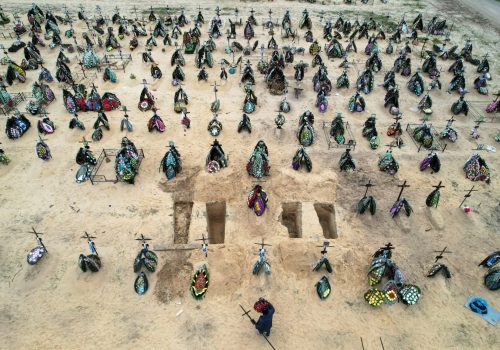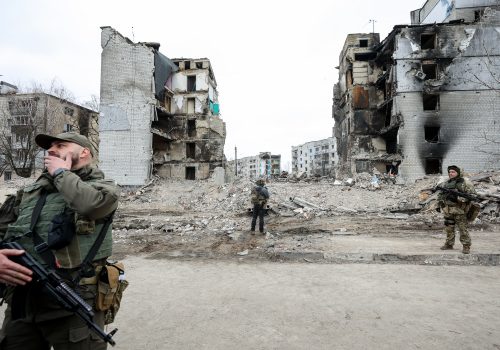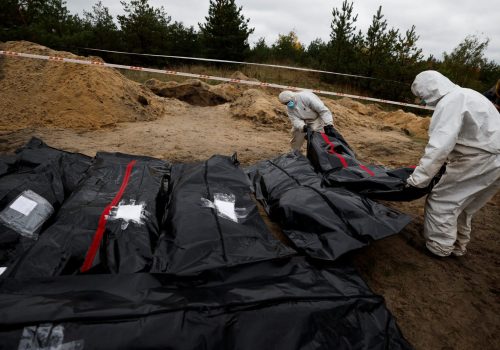The case for seizing Putin regime assets
Halfway through the second year of Russia’s full-scale invasion of Ukraine, the world has grown far too complacent regarding this attack on the bedrock of the international order. This poses extreme risks. Russia has not only inflicted vast human suffering on Ukraine, but willfully sent a barrel bomb straight through the most basic principles of global stability, exacerbating global food and environmental crises. No actions taken thus far have adequately responded to this gaping chasm. In particular, the seizure of Russian assets flowing from aggression and atrocities remains a neglected tool, despite its promising potential to hasten Russia’s retreat, bolster Ukraine’s recovery, and set a precedent for global atrocity and aggression prevention.
While Global South perspectives may diverge on questions of accountability, there is agreement on the primacy of ending the global threats posed by Russia’s war in Ukraine, particularly to mitigate its impacts on other challenges like climate and food security, and reforming the international system toward a more equitable balance of power. Major powers shaped the reconstruction of the World War II-era international system in enduring and unequal ways, with no example starker than the continental gaps on the United Nations (UN) Security Council. Today, Russia’s universally condemned war of aggression has opened the door for a truly united, post-imperial response to remedy past inequities through economic countermeasures.
Kenyan Ambassador to the United Nations Martin Kimani powerfully articulated the global importance of defeating and deterring Russia’s neo-imperialism days before its full-scale invasion of Ukraine in February 2022. In his speech at the UN Security Council, he rebuked Russia’s President Vladimir Putin for rejecting diplomacy and for using military force to put multilateral norms “on its deathbed.”
Unanswered, unprecedented Russian crimes
Kimani’s call to preserve the international order, and the security it brings to large and small countries alike, remains unanswered. A comprehensive response, however, cannot be sustained through military support for Ukraine’s ability to defend itself alone. It must be supplemented by the full range of economic options to pressure Russia to retreat, including the seizure of implicated assets. A program of asset confiscation is justifiable on legal, moral, and political grounds, and the multilateral blueprints for such an action already abound.
First, Russia’s war of aggression is a stark and clear-cut international crime against peace, unleashing destruction to the global order. For all of its shortcomings, the post-World War II system ushered in institutions through which security and economic concerns can be channeled, centered around principles of stability and predictability. Even when defied, the norms of state sovereignty and territorial integrity themselves have not been questioned—until now. Russia’s insistence that it can annex and forcibly integrate five separate provinces of Ukraine’s internationally recognized territory evinces the regime’s broader, catastrophic goals of empire. Moscow’s violent actions flagrantly violate the underlying international norms that every single security, monetary, trade, and diplomatic institution relies upon. The growing acceptance and focus on a tribunal for the crime of aggression reflects a recognition of the urgency to prosecute and redress the root cause of the entirety of destruction wrought by this war—a process already under way in Europe. In July, the European Union Agency for Criminal Justice Cooperation (Eurojust) opened the International Centre for the Prosecution of the Crime of Aggression Against Ukraine in The Hague.
Second, Russia is waging its onslaught against Ukraine in a way that maximizes civilian destruction and suffering, trampling all humanitarian principles. Russia’s attempt to destroy the protected Ukrainian national group is no mere incidental effect, but a driving war strategy. While outright political violence is a key tactic, the Kremlin is also targeting civilian and agricultural infrastructure, using hunger as a weapon of war to deny the conditions of life that support the everyday existence of Ukrainians and disproportionately impacting developing nations reliant on its grain exports. Policymakers must use all the available diplomatic, economic, and political tools to respond to these atrocities in kind.
Finally, beyond Russia’s crimes of aggression and systematic atrocities, the entrenched kleptocratic nature of the Russian ruling class strengthens the case for asset seizures. In 2014, US political scientist Karen Dawisha dubbed Russia a “kleptocracy,” combining the Greek for “thief” and “rule” to denote the highest possible degree of entrenched, virtually unchecked grand corruption, tracing all the way up to looter-in-chief Vladimir Putin. As the regime inflicted hundreds of billions of dollars’ worth of damage in Ukraine, the crony-capitalist system continues to operate through a network of ruling elites who use public institutions for massive embezzlement. Now the bill has come due, through the Russian leadership’s own egregious, atrocious campaign of violence and terror against its neighbor.
Yes, Russia’s unprovoked war of aggression against Ukraine is unprecedented in the modern era. Yet, more than eighteen months into its onslaught, the collective international response is falling short of meeting the challenge and pressuring Russia to change course. The prevailing Western approach prioritizes the steady flow of military aid to Ukraine, while relying upon unprecedented cooperation in regional security and economic sanctions as primary forms of deterrence. However, global damage to the international system itself will never be solved by efforts that avoid using all available tools.
Russia took measures to prepare its economy for the consequences of its invasion, and is sustained by illicit financial networks and trade filled in by regimes such as China, Turkey, India, Belarus, and others in Central Asia. Some Western analysts are still projecting economic growth in Russia this year. Policymakers, therefore, need to look at additional measures targeting the drivers of Russia’s war machine—its sources of funding and support. The confiscation of sanctioned assets is the most responsible policy to achieve these ends.
What to do next
Any policy seeking to deter Russia must account for the uniquely kleptocratic nature of its oligarchy—a system of deeply entrenched loyalists who control the country’s most lucrative industries and preserve Putin’s status and decision-making powers—an arrangement that blurs the lines between state and privately held assets. The fundamental distinction to be made when seeking to confiscate assets cannot be determined along strict private and public lines, but should target the funds enabling the war and protect funds that are, or will be, actually invested in Russia’s domestic development.
To illustrate, the Kremlin just doubled its defense spending this year to more than $100 billion—one-third of all public expenditure. States can create a presumption that all of Russia’s defense-allocated money is supporting the war and is, therefore, subject not only to freezing but to seizure. The European Union (EU), other Group of Seven (G7) countries, and Australia have frozen an estimated 300 billion euro of Russian central-bank reserves; central-bank assets should be included in any confiscation program. At the very least, these assets should immediately be transferred to an international fund for eventual disbursement for reparations. As for individualized sanctions, the multilateral Russian Elites, Proxies, and Oligarchs (REPO) Task Force has blocked or frozen more than $58 billion in sanctioned assets, but the Kremlin and regime loyalists can afford to weather a temporary hold on a fraction of their wealth. Countries should give teeth to these policies by confiscating the sanctioned assets and starting the reparation process. This would both increase the pressure on the war’s architects and enablers to end the war, and compensate the victims in real time. A combined approach of targeted sanctions, asset seizures, and denials of foreign investment should promote individual survivability or defection within Russia’s diverse oligarchic circles—with communication clear that seventy-year-old Putin will bequeath an economic albatross to both his country and his cronies.
Targeted sanctions represent a breakthrough for atrocity prevention, accountability, and deterrence because they impose immediate costs and narrowly penalize the principal perpetrators, not the country’s citizens. The threat of prosecuting international crimes has proven to be an ineffective form of deterrence. When foreign policy responses apply heightened criminal standards or democratic constitutional guarantees to individuals who are verifiably supporting a war of aggression, they perpetuate a culture of impunity.
A program of sanctioned asset confiscation connected to the most serious breaches of international law can be justified on both pragmatic and legal grounds. When one looks more closely at the main arguments cautioning against confiscation, they betray either a blind faith in international rules completely detached from reality or, worse, are simply a smokescreen to protect powerful financial interests. The pace at which governments are willing to ramp up military engagement as the primary strategy of deterrence, as compared to the stagnation in movement toward adopting non-forcible measures to confiscate assets, should be cause for alarm among concerned citizens and taxpayers. The confiscation of assets would doubly serve a sustainable function of penalizing the perpetrators while diverting those funds toward further assistance and reparations.
The main challenges to a policy of confiscation revolve around the uncertainty it might inject into the international financial and investment system. Given China’s position in this system, some economists have raised concerns that the seizure of Russian state assets can create a precedent that could lead to China’s exit from the US Treasury market. However, these concerns fundamentally misunderstand or neglect the far greater threat to that stability and financial-market predictability caused by the arbitrary use of force and aggression. Trade intended for China has also been disrupted by Russia’s military violence against Ukraine’s civilian infrastructure, and clear diplomatic messaging can underscore these short- and long-term realities. A world ruled by the use of force inherently obliterates the fabric of an international order ruled by accepted norms in ways that affect all countries. The cautious preservation of the old system failed, demanding bolder policy to confront threats to the foundations of the international order.
Military aggression is more than a crime or a breach of international law; it is an attack on the very foundation of the international order. If aggression goes without adequate response and becomes the norm, there will be no international rules to guide future security predictability, multilateralism, and trade. When facing such a clear, urgent, and present threat to the system itself, states should prioritize preventing its collapse over a misplaced faith that authoritarian regimes will comply with the rules. This reasoning should also encourage democratic states to cooperate around policies of asset confiscation despite disparities in held assets. This applies to states ranging from Belgium, which holds a considerable percentage, to the United States, which holds considerably less.
The executive and legislative branches can overcome challenges to confiscation orders or legislation in this exceptional case by drawing a clear line at the crime of aggression, a threat to the international order that demands a united response. This policy can strictly delineate a triggering nexus between sanctioned individuals or entities and acts of aggression, as well as “public” funds connected to acts of aggression. The basic definition of aggression is internationally accepted in United Nations General Assembly Resolution 3314 (XXIX): “the use of armed force by a State against the sovereignty, territorial integrity or political independence of another State.” The International Court of Justice further characterized the prohibition on the use of force as “a cornerstone of the United Nations Charter.”
In this situation, the UN General Assembly has already passed four resolutions unambiguously recognizing Russia’s responsibility for aggression, and an additional resolution endorsing an international register for the damage caused by Russia in Ukraine for eventual reparations. Each of these impartial, authoritative resolutions can underpin national legislation or executive action authorizing the confiscation of assets connected to the perpetrators and enablers. As referenced, a key concern around confiscation is the potential withdrawal of foreign reserves from US banks. However, under the proposed legislation or executive order limited to aggression, foreign actors would be assured that their funds and investments are secure in the US financial system so long as they do not commit the crime of aggression. If laws are more broadly worded to protect victims of abuses and atrocities, this would be a mark of progress because regimes would withdraw their money for fear of scrutiny of their human-rights records.
Others argue that confiscation will lead to reciprocal treatment, increasing the risk to assets abroad. However, here too, it is less a risk than a safeguard that would disentangle a country’s assets and investment from complicity in military aggression or mass atrocities. Moreover, these assets are already at risk within authoritarian systems that lack independent courts or any protections against arbitrary seizure. For instance, the Kremlin recently put in place a 10 percent tax on companies exiting the country and a windfall tax on excess profits by Russian companies—money that is redirected to the war effort.
International lawyers have also raised the issue of sovereign immunity as attached to “state” assets, or argue that there are minimal precedents to support confiscation. However, international law provides injured states with the right to take unilateral countermeasures that would otherwise violate international law, including principles of immunity, to induce another state to comply with its obligations. In this case, all states are injured by a war of aggression (erga omnes breach affecting the international community as a whole) and, therefore, are entitled to take countermeasures in the form of confiscating state assets to induce Russia to end its aggression or fulfill its obligation to compensate Ukraine.
Some have mistakenly argued that countermeasures should be taken in a way that can be reversed, thereby precluding permanent confiscation in favor of halfway measures like freezing assets. However, international law does not require a literal reversal of the countermeasures, but rather the resumption of normal obligations under international law. Here, these obligations have been inexorably altered by Russia’s aggression, incurring its additional obligation of paying full reparations for the injuries caused, which can partially be fulfilled through confiscated assets.
In an interview with the authors, Anton Moiseienko, a leading expert on targeted sanctions, stated, “the law of countermeasures allows other states to seize Russia’s assets in fulfilment of the obligation to compensate Ukraine for the damages caused by its aggression, as long as those measures aim to make Ukraine whole rather than punish Russia.”
Moreover, the formation of international law is an ongoing process that is shaped by opinio juris and state practice in response to the contingencies of world affairs. Canada, for example, has already announced it is seeking the forfeiture of $26 million from a company owned by Russian oligarch Roman Abramovich, pursuant to new legislation allowing for the confiscation and repurposing of sanctioned assets for the reconstruction of the affected state, restoration of peace and security, or compensation of victims. The United States has an opportunity to follow Canada’s lead in the spirit of eventual international consensus by adopting a program of confiscation as an effective and sustainable foreign policy response or countermeasure to aggression and mass atrocities, building on the work already under way by its KleptoCapture task force.
Pragmatic considerations
A failure to confiscate these assets not only projects weakness and indulgence, but also gives a generous windfall to oligarchs, perpetrators, and corrupt officials, who are already evading sanctions behind the secrecy of offshore financial networks, and a blueprint for exploiting loopholes between state and private assets in this uniquely kleptocratic context. The argument that confiscation will undermine efforts to secure a diplomatic solution is also baseless, given this Russian regime’s clear disavowal of diplomacy in favor of brute force. Where good-faith diplomacy is not on the table, the United States can only effectively respond with lawful and entirely legitimate measures that will pressure Russia to change its behavior. The concern that confiscation of assets would result in escalation is even more tenuous, particularly when viewed against the military and defense policies of deterrence already in place.
This necessary process can be done in a sophisticated and responsible way— linking confiscated funds to key financial flows supporting the regime and its war machine. Important technicalities, including the legal definition of an “asset” and the seizure of investment interest, can be engaged through legislative debate, allowing Congress to also funnel individual oligarchs’ rights of appeal through the Supreme Court, rather than numerous individual challenges. With the advantage of moving swiftly, targeted executive action could also circumvent issues posed by sovereign-immunity concerns. Russia’s war of aggression is a matter of national and international security, requiring swift, resolute action targeting its funding and codified into law and policy.
The continued financial flows funding or supporting regimes committing mass violence with impunity is not unique to Russia’s war against Ukraine. If the United States and likeminded countries are serious about imposing costs for waging a war of aggression and the attendant incalculable human suffering, they need to implement policies and legislation that directly target perpetrators’ means, funding, and motives. Russia’s blatant war of aggression lays bare the urgency of enforcing such policies to protect the international legal order and rebuilding what the Kremlin has left in ruins.
About the authors
Kristina Hook is assistant professor of conflict management at Kennesaw State University and a nonresident senior fellow at the Atlantic Council’s Eurasia Center. She is the lead author of the expert report The Russian Federation’s escalating commission of genocide in Ukraine: A legal analysis.
Yonah Diamond is an international human rights lawyer at the Raoul Wallenberg Centre for Human Rights, specializing in atrocity accountability and prevention. He is lead author of the expert report An independent legal analysis of the Russian Federation’s breaches of the Genocide Convention in Ukraine and the duty to prevent.

The Eurasia Center’s mission is to promote policies that strengthen stability, democratic values, and prosperity in Eurasia, from Eastern Europe in the West to the Caucasus, Russia, and Central Asia in the East.
Related content
Image: A Russian ruble banknote is placed on US dollar banknotes in this February 24, 2022, illustration. REUTERS/Dado Ruvic


